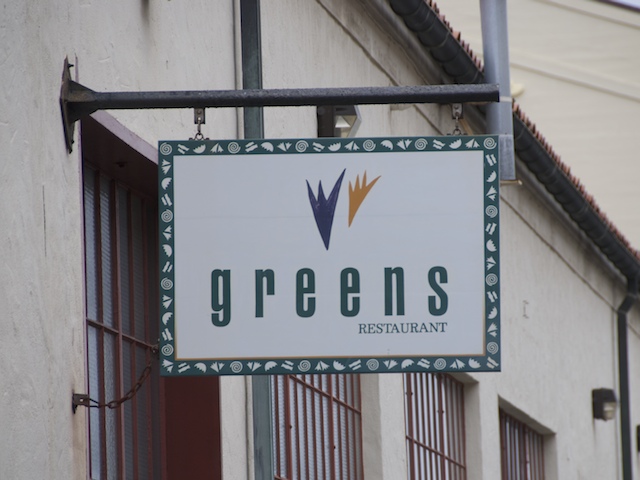
reference-image, l
(article, Kim Carlson)
[%pageBreakSettings nobreak=true] A couple of weeks have passed since we first set foot in the Victory Garden at Slow Food Nation — which we wrote about here, here, and here — and we're happy to note that the garden will be allowed to flourish on its City Hall site at least until November. We hope, too, that the other, less literal, seeds that were planted at the Labor Day weekend event will also take root in the coming months. That's what we came home with, folks: A big bushel of optimism. After listening to several panel discussions, chatting with farmers, chefs, and food purveyors, and hearing firsthand or reading snippets of impressions from attendees, I was, well, gleeful about the prospect of wider-spread food awareness. What could be more important than the very stuff we put into our bodies? [%image reference-image float=right width=400 caption="Greens Restaurant was the site of the Slow Food Nation benefit dinner for the Marin Agricultural Land Trust."] I also know, however, that awareness is just a start. All of us who care about such issues as environmental stewardship, fairness for farmworkers, and the health of our communities must work to cultivate good food. One of the ways we can do this is to inform ourselves about good food choices, and then to make those choices, even if they cost a little more. If we can afford good, clean, and fair food, we should invest in it. On the most basic level, food is about taste — ideally, pleasure — and in some ways, maybe taste should guide us in any discussion about it. Of course, there will always be those who prefer the taste of a Whopper to an eggplant and summer squash gratin with peppers, torpedo onions, basil, tomatoes, and a goat-cheese custard — like the one we ate at Greens during a fundraiser on Saturday night (more about that in a minute). [[block(sidebar). h1.Summer recipes Annie Somerville, the talented chef at Greens, shared these recipes with guests at the dinner benefiting the Marin Agricultural Land Trust, and we're sharing them with you. Hats off to Annie.]] But with greater awareness of the issues surrounding the feedlot origins of that Whopper, will it begin to leave a bad taste in even the most ardent beefeater's mouth? And with greater awareness of the small-farm origins of those summer vegetables, will more people seek them out? As Holly Brubach writes in this month's Gourmet magazine, "Pleasure is both something to be discovered, there for the taking, and something to be cultivated through \[one's\] own efforts." Food should be pleasurable. And we all need to make the effort to know more about what we're eating. For widespread food awareness to be achieved, more people — including those who grow and harvest our food — must have access to affordable, clean, and healthy food. Carefully grown and thoughtfully prepared food reflects a measure of respect, which starts at the farm and extends through the marketplace to the table. I know it's Pollyanna-ish (or perhaps Aretha Franklin-ish) to suggest it, but couldn't we benefit from a little more respect all the way around? I found heartening the story Raj Patel told during a panel on Friday about a program that feeds low-income people in Oakland (as taken from his blog): bq. Bay Area Community Services runs, among other things, a meals-on-wheels program that weaves through some of the poorest areas of Oakland, serving over 30,000 meals per month. Most clients earn less than $10,000 dollars per year, and most aren't able to cook for themselves. For years, BACS served mass-produced food, bought from SYSCO. Recently, they switched to a farm-to-table approach, sourcing ever-increasing amounts of produce from within 150 miles of the Bay Area, by partnering with the Community Alliance with Family Farmers. bq. Switching to fresh fruit and vegetables costs more, but not much. The price of microwaveable slop, per meal, was $1.65. With fresh local food, the ingredients cost 5 cents more. Of course, there's a higher labor cost per plate in putting the meal together, but that's to be expected — preparing fresh food takes more time and skill than does the reheating of mush. bq. But the kicker is this. With every meal comes a little envelope, into which people are gently encouraged to place a donation if they can, to help cover costs. In the three months since the farm-to-table service started, donations have gone up by $20,000 — a 23 percent increase. This, from the poorest people in the Bay Area, in the middle of the credit crisis. Hear, hear for the idea of supporting the investment in good food! Now let's get our government to follow suit with a comprehensive farm bill that supports sustainable farming nationwide. And whether you support the efforts of the organization Slow Food or, simply, the values of good, clean, and fair food, I hope you'll join us in going forward with optimism and goodwill toward all who work for those measures. That's in part how several of us from Culinate found ourselves Saturday night (August 30) at one of several fundraising dinners held in the Bay Area during Slow Food Nation. This particular dinner, held at Greens, benefited the Marin Agricultural Land Trust, which has been hard at work preserving farm land in Marin County, California, for nearly 30 years. And they've been successful, preserving more than 40,000 acres. Culinate is a small business on a tight budget, but we were honored to support their work and enjoy an unforgettable dinner at Greens. Let's hear it for farm land, for tastes that are truly pleasurable, and for the efforts of everyone who's working to make food and the issues that surround food a bigger part of the national — indeed, international — conversation.

reference-image, l